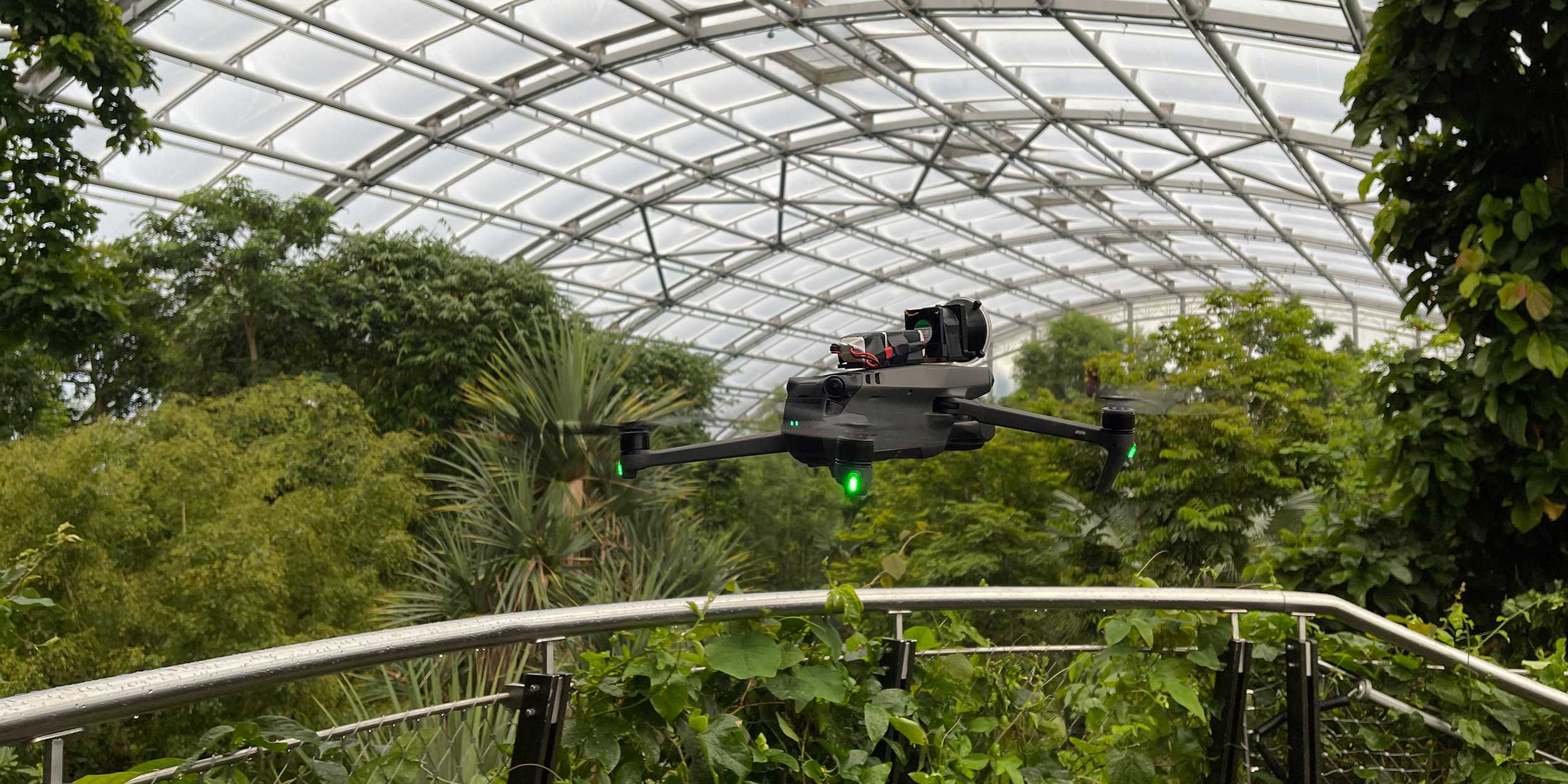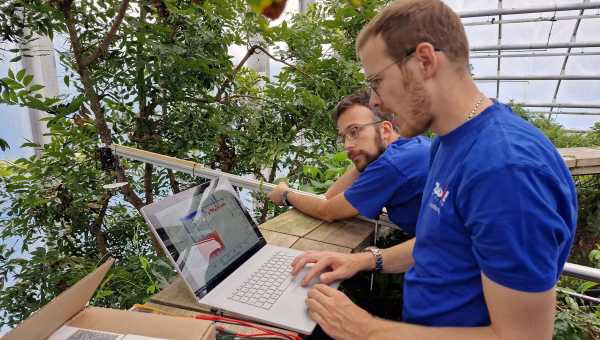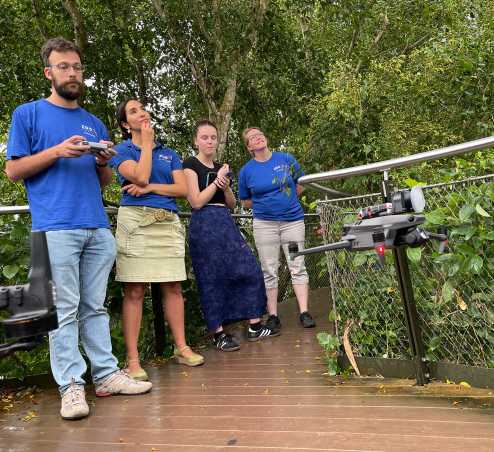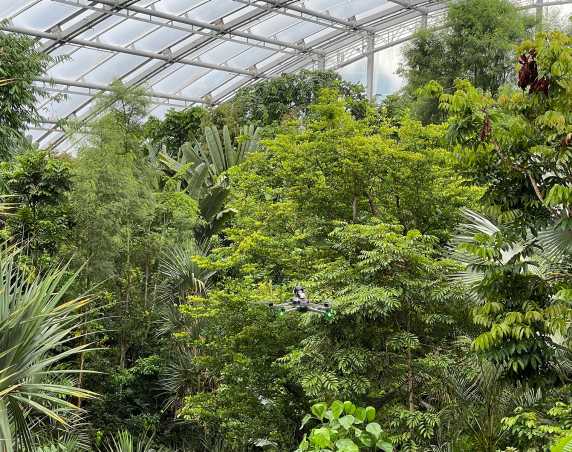
A team led by researchers from ETH Zurich and WSL advances to the finals of the XPRIZE Rainforest Competition. The international competition aims to promote the development of autonomous technologies for collecting data on biodiversity.
In brief
- Led by ETH and WSL researchers, the ETH BiodivX team took part in the semi-final of the international XPRIZE Rainforest Competition.
- In the semi-finals, the teams first collected eDNA-samples with drones and autonomous vehicles without setting foot in the rainforest. They then analyzed the collected data and identified hundreds of plant and animal species.
- The technologies the ETH BiodivX researchers developed were so successful that the team will advance to the 2024 finals as one of six groups.
The XPRIZE Rainforest Competition is an international contest offering the winning team generous prize money of five million US dollars. It aims to promote the development of autonomous technologies that can be used to collect data on biodiversity. Unmanned research vehicles ("rovers") and drones are used to monitor rainforest biodiversity to provide a deeper understanding of the ecosystem. The XPRIZE Rainforest project started in 2019 with just under 300 teams, which were gradually narrowed down to 14 in the semi-finals. These were held in the Singapore rainforest in June 2023 and included ETH BiodivX, a team led by ETH Zurich comprising 29 members from 13 different countries whose aim is to demonstrate the effectiveness of their jointly developed technologies. In total, 56 people from 15 organizations contributed to the ETH BiodivX team, including the three ETH spin-offs Restor, Diaxxio, and SimplexDNA.
The semi-final challenge
Each team had 72 hours in total to complete their task: 24 hours to collect samples and 48 hours to analyze the findings and compile a report. The challenge was to identify as many species of plants and animals as possible across an area of 100 hectares without actually setting foot in the jungle.
Over 24 hours, the ETH BiodivX team's drone scanned the rainforest 41 times, collecting 50 samples of environmental DNA (eDNA). These are DNA traces that living beings leave behind in their habitat - through excretions or the loss of skin and hair particles, for example. By collecting eDNA, the presence of different species in a given area can be detected. Using drones, the ETH BiodivX team collected three different types of eDNA samples: water, air, and surface samples. To collect the surface samples, the researchers developed a probe that could take swabs from a wide variety of surfaces. This was attached to a drone and could be lowered deep into the rainforest by a winch. "This technique allows us to sample environmental DNA from inside the tree canopy, which would otherwise be impossible to access," explains ETH Professor Stefano Mintchev, a member of the ETH BiodivX team.
A rover and a drone, developed by researchers from the University of Aarhus and TU-Delft, were also used during the semi-finals. During their deployment in the rainforest, these autonomous devices recorded a total of 130 gigabytes of video and audio data. Citizen scientists and AI algorithms, co-led and deployed by Zurich-based non-profit organization GainForest, monitored their activities via a live stream and identified additional species.
Overall, more than 12 million DNA sequences were produced, and the team was able to detect a total of 257 plant and animal species. The findings were then compiled in a report numbering more than 70 pages.
Zoo Zurich: the ideal practice environment
The hot and humid conditions in the rainforest pose a significant challenge for the electronics used. Moreover, sampling techniques also had to be practiced before the researchers set off for Singapore. Fortunately, the Masoala Rainforest in Zoo Zurich provided the ideal practice conditions. "Alongside our mission to educate, conserve nature and protect endangered species, one of the four core tasks of a modern zoo is research. Our collaboration with ETH Zurich is a great example of how the Masoala Rainforest can be used for testing and optimizing research methods before deployment in the field," explains Dr Leyla Davis, Research Curator at Zoo Zurich.
The 2024 final
On Monday, July 24th, the six "XPRIZE Rainforest Competition" finalists were announced at external pagethe ICCB 2023 conference. The intensive and long-term work on the project paid off as the group ETH BiodivX made it to the final round of the competition. "This achievement represents a remarkable milestone for our team. We owe our success to the exceptional mix of individuals from a wide variety of disciplines who contributed their ideas and diverse skills from robotics, DNA sequencing, social sciences, and other fields," declares Stefano Mintchev.
ETH-professor Kristy Deiner adds: "There could not be a better time for such a competition to bring forward the solutions needed for helping with the biodiversity crisis. We are honored to be among the finalist teams. Most importantly, we look forward to advancing our technologies." The teams that made it to the last round can now revise their technologies again before proceeding to the finale in 2024.









